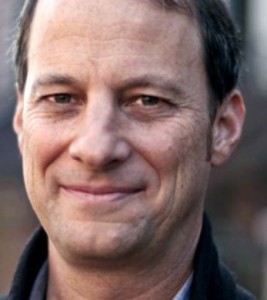RPCV writers at The New Yorker
The March 7, 2016 issue of The New Yorker features two articles by RPCVs.
 Peter Hessler (China 1996-98) is a staff writer living now with his family in Cairo, and he writes “Living-Room Democracy,” an article on political candidates in Egypt who go door-to-door seeking votes.
Peter Hessler (China 1996-98) is a staff writer living now with his family in Cairo, and he writes “Living-Room Democracy,” an article on political candidates in Egypt who go door-to-door seeking votes.
He starts with Yusuf Hasan Yusuf, a candidate for the new national parliament from rural Upper Egypt, who has no public political activity. Yusuf has no platform, and does not talk about issues, policies, or potential legislation when he campaigns. He has never made a single public campaign promise. Yet he still wins elections.
Peter then goes onto interview and follow other candidates, mostly in Upper Egypt, on their home visits in this political season, and he does a quick evaluation of the Muslim Brotherhood’s Freedom and Justice candidate, as well as, fill in how Upper Egypt has gone from nomadic Bedouin to a fledgling democracy.
 In the back of the New Yorker issue, in the “Books Section,” is a review of the memoir written recently by former C.I.A. head Michael Hayden, Playing to the Edge: American Intelligence in the Age of Terror. The reviewer is George Packer (Togo 1982-83). Packer writes, “Spymasters are supposed to be good at keeping their mouths shut, so it’s striking how many heads of the Central Intelligence Agency have published memoirs. Just in the years since September 11th, three former directors — George Tenet, Leon Panetta, and now Michael V. Hayden — have felt compelled to tell tales.” He then adds, “A fourth, David Petraeus, cooperated with his biographer so fully that he provided her with classified information.” [As well as “much more,” but that’s my quote.]
In the back of the New Yorker issue, in the “Books Section,” is a review of the memoir written recently by former C.I.A. head Michael Hayden, Playing to the Edge: American Intelligence in the Age of Terror. The reviewer is George Packer (Togo 1982-83). Packer writes, “Spymasters are supposed to be good at keeping their mouths shut, so it’s striking how many heads of the Central Intelligence Agency have published memoirs. Just in the years since September 11th, three former directors — George Tenet, Leon Panetta, and now Michael V. Hayden — have felt compelled to tell tales.” He then adds, “A fourth, David Petraeus, cooperated with his biographer so fully that he provided her with classified information.” [As well as “much more,” but that’s my quote.]
George does a great job of trashing Hayden’s book and Hayden himself who, Packer writes, “had a number of glowing things to say about George W. Bush and Dick Cheney, none about Barack Obama. Bush is a good listener, avid for details, ready to hear hard truths from his intel people and make policy accordingly.” Obama, on the other hand, Hayden goes onto write, “is indecisive, hypocritical, and — on issues like torture and negotiating with Iran — wrong.”
George points out that Hayden insists that “vital information about Al Qaeda came from these [waterboarding] techniques, while at the same time George notes that “a thick Senate Intelligence Committee report, numerous journalistic investigations, and the accounts of certain intelligence offices” contradicted that fact. He also writes that the Senate Committee was in agreement with “numerous journalistic investigations, and the accounts of certain intelligence officers. When it comes to detainee deaths, innocent men wrongfully held in brutal conditions, and other abuses, Hayden barely glances over his shoulders.”
I guess I would suggest you read Packer’s review in The New Yorker and skip Michael Hayden’s book on torture and transparency at the C.I.A.
It seems that ex-spymasters can strut their versions strewing flowers and brickbats as if anyone really might credit their tall takes with family wakes’ tales and booze-driven flower-covered short memories as conduits for power wonks. As George Packer it seems to be saying we need more than bottomless tankards of Jack Daniels-green-label-brew to make us forget.
May I quote here a great poem by Marianne Moore, about MARRIAGE
“This institution
perhaps one should say enterprise
out of respect for which
one says one need not change one’s mind
about a thing one has believed in,
requiring public promises
of one’s intention
to fulfill a private obligation….”
Barton Associates – Facebook